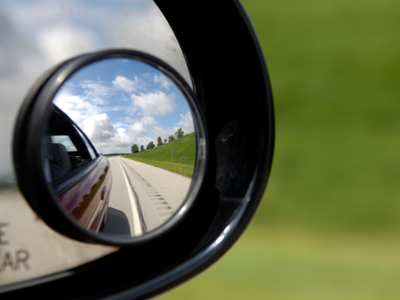
Ask the AI Tutor
Need help with Physics - Reflection (AQA)? Ask our AI Tutor!
AI Tutor - Lucy
Connecting with Tutor...
Please wait while we establish connection

Smooth surfaces reflect light better than rough ones.
Physics - Reflection (AQA)
Explore how light reflects from mirrors and rough surfaces, use the law of reflection in ray diagrams, and understand how images form in GCSE Physics questions.
1 .
A solar furnace can be used to cook food in sunny places where it is difficult to obtain other fuels. It works by reflecting and focussing the Sun's heat. What would be the best shape and material for a solar furnace?
Flat, dark and matt
Concave, light coloured and shiny
Convex, light coloured and matt
Flat, grey and shiny
Since it needs to focus the Sun's thermal radiation (infrared) onto a cooking vessel, the only option is concave. The others all produce vurtual images
2 .
Which of the following statements about reflection is not true?
Echoes only occur in the countryside
The angle of incidence is the same as the angle of reflection
The normal is drawn as a dotted or dashed line on ray diagrams
Rough surfaces scatter sound in all directions
Echoes occur in towns and cities too but you are not usually aware of them
3 .
What is an incident ray of light?
A ray of light that the police shine when there has been an incident on the road
A ray of light that is leaving the surface of a mirror
A ray of light that is hitting the surface of a mirror
A ray of light that is shining parallel to the surface of a mirror
You can also use the phrases 'incident wave', 'incident wavefront', 'incident sound wave' etc. In terms of waves, incident simply means the wave that is approaching the reflecting surface
4 .
The location of a virtual image in a plane mirror appears to be where?
The same distance behind the mirror as the object is in front
The same place as the object
Behind the mirror but at half the distance of the object
Behind the mirror but at twice the distance of the object
A reflection always appears to be as far behind the mirror as the image is in front. If you haven't already learnt about Pepper's Ghost in your science lessons, look it up when you have finished on this website
5 .
When you look at yourself in a mirror, your image is:
real and identical to you
virtual and identical to you
real and laterally inverted
virtual and laterally inverted
Right and left are reversed in a reflection
6 .
A sound wave hits a brick wall at 36o from the normal. At what angle does it reflect?
126o
63o
54o
36o
Remember the Law of Reflection...
7 .
A hiker shouts to their friend and 4 seconds later hears an echo of their shout. If sound travels at 330 m/s, how far away was the cliff that reflected their shout?
At least 2 km
About 1.5 km
Exactly 1,320 m
660 m
You could use the equation speed = distance ÷ time or simple logic. The key thing is to remember that an echo is a 'there and back' journey
8 .
What is a virtual image?
An image that can be projected onto a screen
An image that can't be projected onto a screen
An image that is virtually perfect
An image of a person only
Plane mirrors give virtual images, they cannot be projected onto a screen. Concave mirrors give real images, they can be reflected and seen on a screen
9 .
On ray diagrams, what is the normal?
An imaginary line at 90o to the reflecting surface
An imaginary line at 45o to the reflecting surface
A real line at 90o to the reflecting surface
A real line at 180o to the reflecting surface
It is drawn from the point at which the incident ray hits the reflecting surface
10 .
Electromagnetic radiation travels in straight lines, so how come certain radio waves can be detected on the other side of the world without using artificial satellites?
Earth's gravity causes them to bend round
They reflect off a layer in the Earth's atmosphere
They can pass directly through the Earth
When they get to the edge of the atmosphere they are trapped by space
The reflecting layer is called the ionosphere
**Unlimited Quizzes Await You! 🚀**
Hey there, quiz champ! 🌟 You've already tackled today's free questions.
Ready for more?
Ready for more?
🔓 Unlock UNLIMITED Quizzes and challenge yourself every day. But that's
not all...
not all...
🔥 As a Subscriber you can join our thrilling "Daily Streak" against other
quizzers. Try to win a coveted spot on our Hall of Fame Page.
quizzers. Try to win a coveted spot on our Hall of Fame Page.
Don't miss out! Join us now and keep the fun rolling. 🎉
**Unlimited Quizzes Await You! 🚀**
Hey there, quiz champ! 🌟 You've already tackled today's free questions. Ready for more?
🔓 Unlock UNLIMITED Quizzes and challenge yourself every day. But that's not all...
🔥 As a Subscriber you can join our thrilling "Daily Streak" against other quizzers. Try to win a coveted spot on our Hall of Fame Page.
Don't miss out! Join us now and keep the fun rolling. 🎉






